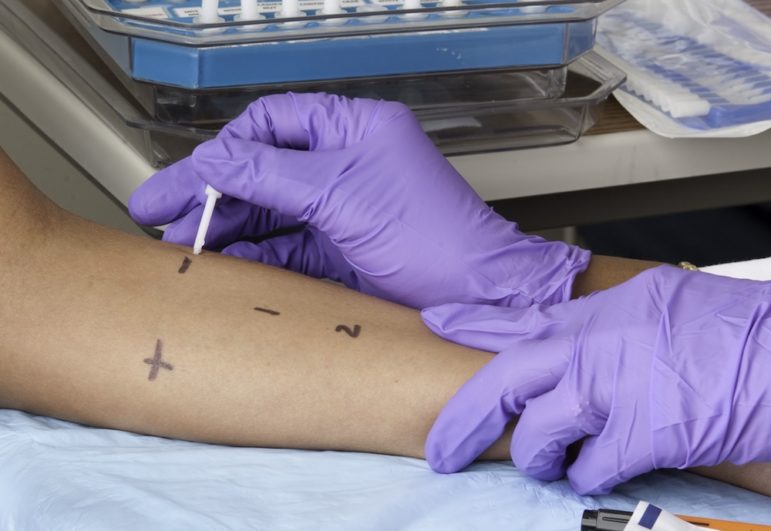
NIH
Medicaid recipients only have access to skin prick testing, which is almost exclusively available through allergy specialists.
As the actions of the current administration in Washington have made clear, the future of the Affordable Care Act (ACA) is quite uncertain. It is therefore imperative that New York State responds, not only by considering comprehensive policies that could replace the ACA at the state level, like implementing a single payer system, but also by working to enact policies that aim to improve the system we currently have in place.
One simple step our state can take to improve access to health care and reduce health disparities among its residents would be to cover allergy blood tests under Medicaid.
The absence of comprehensive allergy testing coverage in our state’s Medicaid program, which would include both blood-based and skin prick allergy testing, disproportionately affects low-income and minority communities.
Let us use asthma as an example. We all know asthma and allergies go hand-in-hand. New York State ranks near the top of the list of states with high asthma rates, especially among children. In 2011, asthma related hospitalizations in New York State cost approximately $660 million, according to a study by the Office of New York State Comptroller Thomas DiNapoli.
Asthma clearly represents a costly expense to New York State’s health care system and a serious health concern among New Yorkers. Yet, studies have consistently shown that emergency room visits and hospitalization related to allergies and asthma can be dramatically reduced when patients receive guidelines-based care. Sadly, too many New Yorkers who rely on Medicaid are not being diagnosed and treated in a timely manner due to the lack of blood allergy testing.
Currently, the New York State Medicaid program severely limits access to allergy blood tests. Practically, Medicaid recipients only have access to skin prick testing, which is almost exclusively available through allergy specialists. With only a few hundred allergy specialists across New York State, scheduling an appointment can take up to six months for Medicaid patients, and require extensive travel. Medicaid patients’ lack of access to blood-based allergy testing is an additional obstacle to providing an already vulnerable population with the care they need to prevent emergency care and medical complications.
Covering blood-based allergy testing under Medicaid would allow primary care doctors, who are the first line of care to most patients, to directly order the test, determine an appropriate course of treatment, and help prevent unnecessary medical complications.
With advances in technology, blood-based allergy testing has not only proven to be as clinically effective as skin prick tests, but it also presents a cost-effective solution to reducing some of the health disparities that plague our state. The National Institute of Allergy and Infectious Diseases (NIAID-NIH) guidelines specifically recommend the use of allergy blood tests in healthcare settings where skin testing is not readily available.
The New York State Legislature has made significant strides in addressing the critical issues surrounding allergy testing. This past June, the Senate and Assembly passed bill S.1222 /A.807 requiring Medicaid to cover both blood and skin prick testing for allergies. Presently, the bill awaits action by Governor Cuomo.
In the absence of action and support from the federal government, Governor Cuomo and Medicaid Director Jason Helgerson have paved paths towards increasing access to affordable health care for all New Yorkers. The benefits of S.1222 /A.807 are undeniable as it promotes a best practice, while helping to reduce potentially avoidable emergency room visits and the high costs that come along with it.
This legislation is consistent with the vision of Governor Cuomo and I look forward to his continued leadership in working to improve access to health care for all New Yorkers by signing this bill into law.
Gustavo Rivera is the state senator representing district 33 and Joseph F. D’Amore, MD, is an allergist-immunologist with Urban Health Plan.








